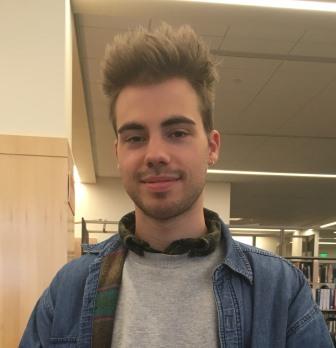Posts Tagged ‘job’

Coming from a family of six children, my parents, unsurprisingly, can’t afford to pay much for my college education. Each summer I work over eighty hours a week to make enough money to pay my university bills and cover the cost of living. I have worked in restaurant kitchens, ice cream stores, and outdoors as a canvasser. Of course the demanding hours and high energy these jobs require leaves little time for summer leisure– but one of the biggest challenges it presents is an inability to apply for internships, many of which are unpaid. Being unable to gain work experience in my area of study creates a whole new path of challenges by itself. Jobs today require more experience than many educated people like myself have the time for. I worry that I will be unable to find a lucrative job after graduation, or that people who have had the resources to take unpaid internships will be favored for their experiences.



I am a resident of Brooklyn, NY and go to the Pratt Institute of Art and Design. My family is unable to afford higher education by itself. Pratt has one of the highest college tuition rates and although it is a private school its students do get help from special programs such as the Higher Education Opportunity Program (HEOP). Without this program, it would be impossible for me and for many other people to afford higher education. Currently I have two part time jobs, which interfere with my schooling.
I am also worried about my future financially when I get out of college. It is hard to focus on schoolwork when finances are an issue, and it is especially hard knowing your parents back home are struggling to secure a future for their child. Funding for education is funding for the future, and I don’t think any person should have to struggle and worry about their future. I do not want others to worry and struggle like my family does. If New York does not fund higher education, they are endangering the future for everyone. Education should be given to anyone who has the desire to learn, regardless of their ability to pay. Please, set an example for the rest of the country and the world by funding higher education.



I’m currently a senior attending Queens College full-time. I’m currently working toward my second degree on the pre-law track. My first degree was from Hofstra University in Biology. I work and study very hard to maintain my good grades and recently it’s becoming more and more difficult.
Because I don’t receive any financial aid, I have to work to pay my tuition out of pocket. I work 60+ hours every week as a medical technician to be able to pay my tuition and purchase necessary textbooks for classes that cost anywhere from $500-$1,000. If the state removes the tuition freeze and encourages CUNY to increase tuition to cover costs, instead of providing adequate state funding, it will only make it more difficult for me to pay for my education. I do not want another tuition hike, and am looking forward to the day when CUNY is once again affordable.



I come from a middle class background in a family of 9 so I never expected to get any financial assistance from my parents. I also never expected to receive financial aid from the government because of my father’s income. I knew college would mean debt and I’ve accepted that. However, I don’t think it’s something that I should have had to accept or that future generations should accept. I work two part time jobs along with an 18-credit schedule and an internship. I am also a part of a resident planning committee for my dorms.
I don’t regret all the hard work I do because I know it’s making me a better person every day. But, I do not like that on top of all that I do, I still have to worry about finding several thousands of dollars in order to continue making contributions to my college and the surrounding community. I have wanted to attend college since I was a little kid, in my mind it represented the first step towards achieving the American dream. However as time went on and I woke up to the reality of America’s true nature, I have come to terms with the fact that I’m going to have to work as hard as I physically and mentally can just to achieve stability. My legislators owe it not only me but to the honor of their office to make sure the financial burden of college becomes a thing of the past.



College is costly to me. I pay through loans and out of my pocket. The cost makes it definitely hard to enjoy college since I need the help of loans to pay for it. I work about 15 hours a week throughout the school year in an attempt to lower the cost of college. I’m the first from my family to get a degree. I am from a Caribbean island, and there, it’s a big deal to get a degree. I’m studying nutrition and exercise sciences at the moment but not sure what’s in store after college. I try not to think about the stress that paying for college and maintaining my grades puts on me. If I do, it makes me very sad and even frustrated with the way the system works here in America. Financial aid has been a huge help, even though it never covers everything (academic, housing, books, meals).



I mainly pay for college through loans and I have a grant through the Educational Opportunity Program (EOP). I’ll eventually be struggling to pay back my loans in the future. I always avoid buying textbooks.
I’ve also worked part-time on campus and those jobs haven’t interfered with my studies. I’ve been able to do my homework at those jobs. I wouldn’t be able to go to college without EOP. EOP grants don’t just help you out with money. They help you with actually getting into college, too. It has its own orientation, pretty much. So, they’re the ones that have accepted me, not necessarily the school.



I went off to college immediately after high-school and I did not have any idea of what I was getting myself into financially. In the first weeks of my first semester I found out that I had to take out loans because I didn’t have enough with my scholarship money, Tuition Assistance Program (TAP) award, and Pell Grant. I also needed money to pay for my books. A worker in the financial aid office told me I had to take out loans in order to pay my bill. I had already moved away from home, settled into the dorms and attended a few classes before I even found out that I didn’t have enough to pay for it. I kind of felt like it was a trap.
And I still had other expenses to pay. I spend most of my extra money on food because the on campus meal plan (financial aid covers this food option) doesn’t have healthy options. There are hardly any vegetarian options and since I’m a vegetarian I am always forced to find food at outside food stores. In order to pay for this, I work every school break there is, summer break, winter break, and even spring break. For me, finding affordable, healthy food adds more stress and anxiety than having to take a mid-term or a final exam.
My undergraduate days are coming to an end and I’m filled with anxiety because I’m already $30,000 in debt. It is estimated that I could pay that off in 10 years, meanwhile, it only took 4 years to obtain. I don’t think getting accepted into graduate school would be a problem because my grades are really good. However, paying for the GRE test, application fees and the cost to attend has lead me to pause. The price of one application fee is enough to buy food for 2 weeks and the cost of the GRE exam is enough to buy me food for an entire month! Sometimes I feel that eventually I will have to sacrifice my nutritional health in order to afford an education.



About 98% of my tuition is covered by scholarships, grants from the school, and federal loans and grants. To most other students attending Syracuse, paying the remainder 2% of the school’s tuition would be easy to cover by their parent’s incomes. However, for me it is difficult and extremely stressful, especially since both my parents’ incomes fall below the poverty line, they speak little English and I am a first generation college student. Knowing this, I could not bear to ask for my parents’ helps in paying for my education, and decided to save up whatever money I made from my job as a cashier during high school. Still though, as life is filled with unforeseen circumstances, a lot of the money I made during high school went towards helping my parents. I have to constantly be in communication with the financial aid office and bursar office to settle my dues.
Like many other low-income students here, I’ve had to take on a job on top of classes in order to pay for books, and to save up for next semester’s tuition. Having to constantly be in contact with the financial aid and bursar office, keeping track of my finances, and working on top of taking classes has definitely taught me how to manage my time and money well, but has also burdened me with a great amount of stress. Attending a private institution such as Syracuse for low-income students is an omnipresent issue in regards to finances. However, I am extremely grateful to attend such a prestigious academy.








